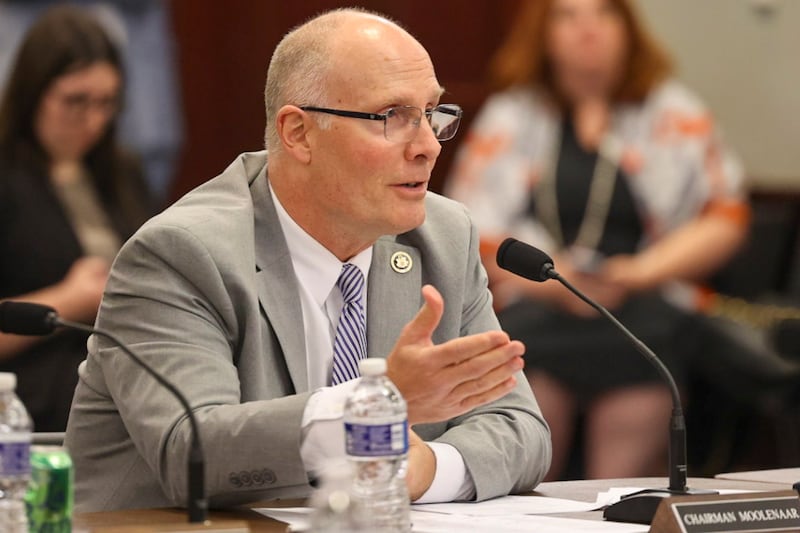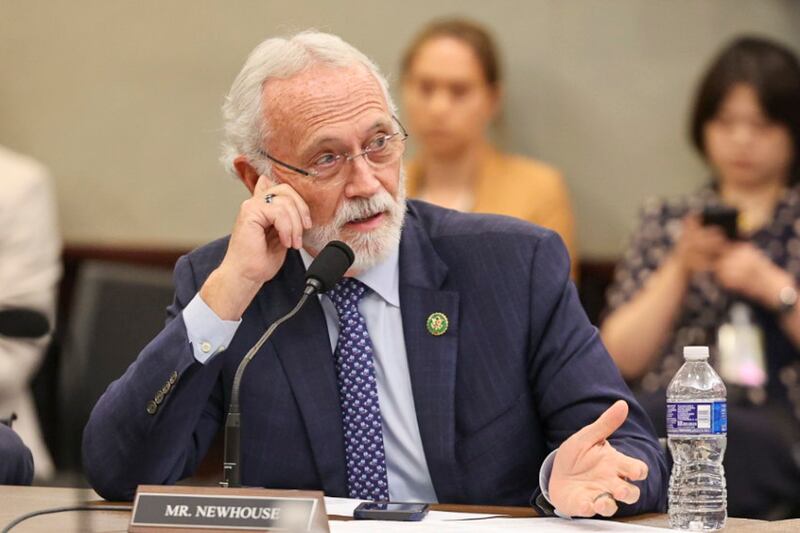The United States should shutter Hong Kong’s foreign offices in Washington, D.C., New York and San Francisco and also revoke the jurisdiction’s special powers to clear U.S. dollar transactions, pro-democracy activists told Congress on Thursday.
The Hong Kong Economic and Trade Offices ostensibly serve to promote trade but in fact serve as intelligence outposts controlled by the Chinese government, the activists said at a roundtable hosted by the House Select Committee on the Chinese Communist Party.
The offices keep track of Hong Kongers who have fled a crackdown at home and must be “shut down, unless autonomy is restored to Hong Kong,” said Frances Hui, the policy and advocacy coordinator for the Committee for Freedom in Hong Kong Foundation, at the event.
“Behind me is what looks like just another townhouse in the center of DuPont Circle,” Hui said, pointing to an image of the office in central Washington, D.C. “It’s an outpost of the Hong Kong government to spy on overseas activists and influence American policies on China.”

The United Kingdom earlier this month arrested three men, including the manager of a Hong Kong Economic and Trade Office in London, who were accused of assisting Chinese intelligence services.
Hui noted there was a bill – H.R.1103, the Hong Kong Economic and Trade Offices Certification Act – before Congress that could close the three U.S. offices. It passed the foreign affairs committees in the House and Senate last year without being brought for a full vote, she said.
“We haven't received an explanation about why the bill hasn't been put on the floor,” Hui said, calling for the House Select Committee to use its “leadership to ensure there is a vote” on the bill.
However, Liu Pengyu, a spokesperson for the Chinese Embassy in Washington, said the offices serve an important role for trade.
“Currently, there are more than 1,200 U.S. companies investing and operating in Hong Kong, and almost all major U.S. financial companies operate in Hong Kong,” Liu said in an email to Radio Free Asia.
The offices are “win-win to the economic and trade cooperation between Hong Kong and relevant countries,” the spokesperson said, before denying they serve as spy outposts. “To politicize the relevant issues will only harm the interests of both countries,” he said.
US dollar transactions
At the roundtable on Thursday, the activists stopped short of suggesting the United States cut ties with Hong Kong entirely.
Asked by Rep. Dan Newhouse, a Republican from Washington state, whether the U.S. government should consider repealing all of the privileges Hong Kong has enjoyed as an autonomous city and instead treat it as just another city in China, the activists demurred.

“I do think that would be the last resort,” said Joey Siu, a policy advisor at Hong Kong Watch, adding it could harm Hong Kongers.
"Repealing the Hong Kong Policy Act would obviously be equal to a blanket sanction on Hong Kong as a city itself," she said, suggesting other paths be exhausted first. "If all of these efforts that we could take are not working, I do think that that could be the last resort."
One of those paths could involve taking aim at Hong Kong’s attractiveness to U.S. companies as an Asian financial hub.
Jonathan Price, a member of the legal team for jailed Hong Kong media mogul Jimmy Lai, told the roundtable that Hong Kong was one of the few places outside the United States that can clear interbank U.S. dollar transactions, with HSBC carrying out the privilege.
That’s a valuable ability when U.S. banks are closed during the day in Asia, he said, and helps the 1,258 U.S. companies based in Hong Kong to do business in dollars when U.S.-based bankers are sleeping.
“It remains the case that only a very small number of jurisdictions – four, in fact – are licensed to clear U.S. dollar transactions outside of the United States: Tokyo, Singapore, Manila and Hong Kong,” Price said, questioning whether the special status was still deserved.
“That is a privilege that ought to be reviewed and revisited in light of the precipitous decline in the state of the rule of law,” he said. “HSBC has a slightly colored history in closing down the accounts of pro-democracy campaigns at the behest of the Hong Kong government.”
“Human rights must not be siloed from business” interests, he said.
“Should the U.S. Treasury be rewarding huge financial institutions, and Hong Kong itself, with this sort of privilege in these circumstances?”
